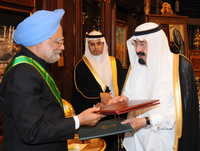Visits by Indian heads of government to Saudi Arabia are rare. In fact, when Prime Minister Manmohan Singh arrived in Riyadh on Feb. 27 for a three-day visit, it was the first time an Indian premier had been to the kingdom in 28 years. However, this is one bilateral relationship where substance has clearly preceded style. Not only has Saudi Arabia emerged as India's largest supplier of crude oil, the desert kingdom is also looking to increase its commercial ties with a rising India as a way to diversify its economy.
The visit culminated in a joint declaration (.pdf) that proclaimed a "new era of strategic partnership" between the two countries, in effect recognizing that India's security perimeter -- now, as in colonial times -- begins in the Middle East. In some ways, this also marks a triumph of Singh's new "Look West" policy, whereby India has sought to raise its profile in both economic and military terms in the Persian Gulf -- a region that provides 70 percent of India's oil and hosts 5 million Indian expatriates. Of late, India has been assiduously putting into place economic and security pacts with various Gulf states, but Saudi Arabia represented the key link to complete the chain. In fact, Saudi Arabia may be replacing Iran as India's key backer in the Organization of the Islamic Conference and has once again agreed to lobby for India's long-desired observer status in the grouping.
But if the deepening of bilateral relations is a result of Singh's "Look West" policy, it also reflects King Abdullah's "Look East" policy. It was the king's visit to India in 2006 that broke new political ground between the two countries, serving to de-hyphenate India from Pakistan in the Saudi worldview. This pragmatism grew out of Riyadh's realization that China is not the only rising giant in Asia capable of playing a significant role to help Saudi Arabia transition to a more mature economy before the oil runs out. India's robust economic performance in the wake of the global financial crisis has only served to underscore this view.

